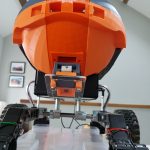 The use of robotics in agriculture is something I’ve touched upon a number of times over the past year or so. Whilst many of these early projects have been research prototypes, a British startup is aiming to bring the technology to market.
The use of robotics in agriculture is something I’ve touched upon a number of times over the past year or so. Whilst many of these early projects have been research prototypes, a British startup is aiming to bring the technology to market.
The company, known as Small Robot Company, bases its technology on the pioneering work of Professor Simon Blackmore from Harper Adams University. It aims to utilize small robots instead of tractors, which the team believe will be both kinder to the environment whilst allowing permaculture to be adopted at scale.
Farming as a Service
The company use robotics and AI to ‘digitize the field’ and therefore offer precision farming on a ‘farming as a service’ model. The aim is to provide the farmer with detailed information on their land, all the way down to a profit map that highlights the best areas to use, the best areas to rest and which plants to sow where and when.
The team believe that this use of technology would significantly reduce the amount of chemical used in arable farming, with estimates of both chemical and energy usage reductions of around 90%.
“We are commercialising a deceptively simple idea: small robots not big tractors. Because unfortunately big tractors are neither efficient nor environmentally friendly. What we have done is to take this idea, work with farmers to understand how it can answer their needs, and make this into reality,” they say.
Smaller is better
Central to their hypothesis is the belief that because robots are smaller than tractors, they can be more precise and thus deliver a greater yield with less inputs. It also opens up the option of working in more irregular shaped fields. They believe that eventually all aspects of farming, from crop care to harvesting will be automated.
“Technology has changed almost every industry – but farming is still stuck on analogue. We want to digitise the field. The potential for efficiency here is phenomenal. You can look at the data as it comes in from the field to make decisions which will take into account agronomy, soil science and market conditions. What to plant where and when to maximise yield. Simply put, this means the ability to apply permaculture techniques at scale,” they say.
They’re currently undertaking trials with Gleadell Agriculture, with the lessons gleaned from this initial project helping the company to further develop both their technology and business model. They hope that by adopting a service based model that it reduces the risk associated with high capital expenditure, and therefore encourages farmers to try the system out.
The sector is one of the most interesting as the potential for digital technologies to improve how we farm is significant, and the implications should this be done tremendously important for society and the planet as a whole. They’re a startup that should be well worth keeping an eye on.